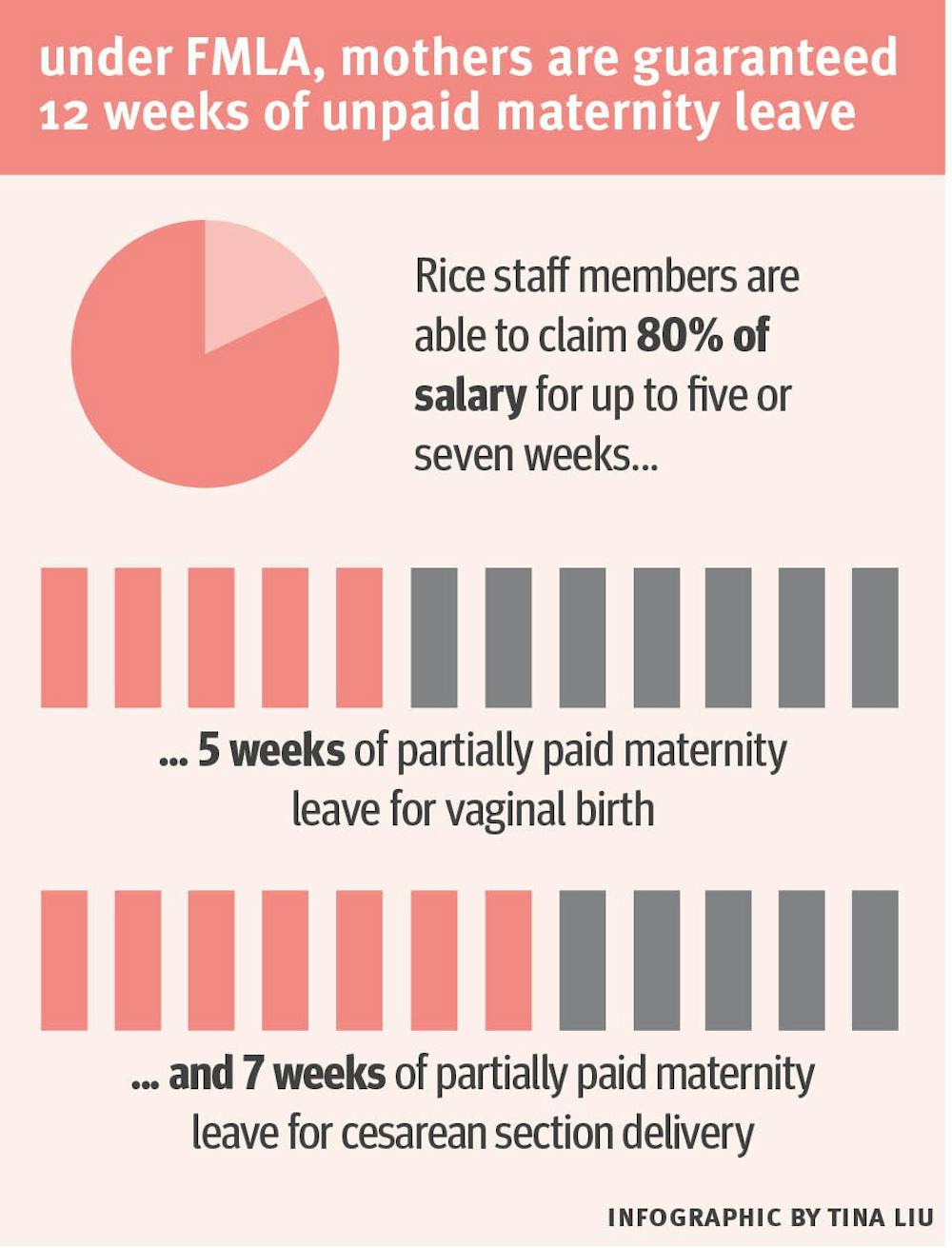Maternity leave policy remains unequal between staff, faculty

Maternity leave benefits for faculty members are more generous than those for staff members, in accordance with maternity leave policies that have remained unchanged since at least 1993.
According to Rice Policy 204, staff members can receive 80 percent of their salary through the William Marsh Rice Short-Term Disability Plan for up to five or seven weeks of their maternity leave, depending on delivery circumstances.
Tenure-track faculty members can receive a full semester off at full pay in addition to the benefits received by staff members.
As mandated by the government, Rice adheres to the Family and Medical Leave Act. Since 1993, this act has granted all Rice faculty and staff the right to at least 12 weeks of unpaid, job-protected maternity leave, according to the FMLA website.
There is no available data for maternity leave policies before the passage of the act.
These partially paid weeks only begin after an absence of five work days.
In order to receive payment during these five days, benefit time, referring to paid days for personal time off, must be used. Afterward, staff members may take at most five weeks of partially paid maternity leave for a vaginal birth or seven weeks of partially paid maternity leave for a cesarean section delivery.
Christine Martinez, associate director of academic advising, said that after the birth of her first son, she made arrangements with her supervisor to take more than 12 weeks off due to the circumstances and obstacles she faced as a new mother.
“The first couple of weeks are crucial to the relationship you develop with your child, and you do need time for your body to effectively heal and find a rhythm for the new human being in your life,” Martinez said.
Faculty members receive the same benefits as staff members along with a longer period of paid maternity leave due to Rice Policy 204.
According to the Rice Primary Caregiver Leave policy, certain faculty who have tenure or on the tenure track are eligible to take a full semester off at full pay in addition to a partially paid short-term disability leave.
Aysha Pollnitz, an associate professor of history, said that the maternity leave policy for faculty allows professors, regardless of gender, to maintain their careers if they have children.
“This is a really great benefit for faculty because it addresses the disadvantage that [female] professors have faced in securing promotion and tenure if they have children,” Pollnitz said.
Other academic institutions like Cornell University have established maternity leave policies that offer similar benefits. Contrary to the policies at Rice, however, both the faculty and staff at Cornell can take advantage of the same maternity leave policies. According to the Cornell Policy 6.2.1, the Cornell Academic Parental Workload Relief — equivalent to Rice’s Primary Caregiver Leave policy — enables both faculty and staff to take one semester off with full pay in addition to a family/medical leave and short-term medical leave.
In Canada, universities allow new mothers to take a full year off with 70 percent of their original salary according to eluta.ca, a top Canadian job search engine. Onsite daycares are also available to the new mothers once they return to work.
Martinez said that she is grateful for her maternity leave policy because it is a lot more generous than others in the nation. However, she said she still wants more time to spend with her child.
“It’s challenging as a first-time mom to try to figure it all out in 12 weeks while also recovering from something pretty major,” Martinez said.
While most employees in the nation have access to only unpaid maternity leave, the employees at Rice are part of the 14 percent of workers in the United States who receive some form of paid maternity leave, according to a Pew Research article.
Martinez said that in her opinion the maternity leave policies in the United States could be improved across the board.
“I think we can do better for working families. It’s heartbreaking to place my daughter in a daycare where I know many of her firsts are happening without me,” Martinez said.
Pollnitz said that while other parents may receive even more time off in different parts of the world, in the United States, she hasn’t heard of a more generous maternity leave policy than the one offered by Rice.
“It would be great if every working parent in the U.S. and their children could benefit from similar terms to mine,” Pollinitz said.
More from The Rice Thresher

O’Rourke rallies students in Academic Quad
Former U.S. Rep. Beto O’Rourke of El Paso, Texas spoke in front of the Sallyport to a sea of sunglasses and “end gun violence” signs April 17. The rally, organized by Rice Young Democrats, took place in the academic quad from noon to 2 p.m.

Five international visas revoked at Rice
Federal authorities have revoked visas for five international affiliates at Rice — three current students and two recent graduates, President Reginald DesRoches announced in an April 11 message to campus. The revocations are “not related to social activism or protests,” a university spokesperson told the Thresher.

Modified Beer Bike races rescheduled to April 18
Beer Bike races have been rescheduled for April 18 at 5-8 p.m. The makeup event was announced in an email to Beer Bike captains, coordinators and stakeholders, from the campuswide coordinators and the Bike Captains Planning Committee.

Please note All comments are eligible for publication by The Rice Thresher.